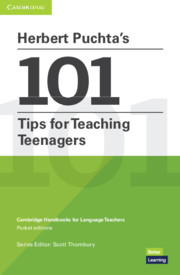 Herbert Puchta's 101 Tips for Teaching Teenagers
Herbert Puchta's 101 Tips for Teaching Teenagers Book contents
B - Classroom Management
Published online by Cambridge University Press: 28 October 2023
Summary
Classroom management is about techniques, skills and strategies you can use in order to help your learners work in a focused, efficient and academically organised way. Without that, the classroom would be a place so chaotic as to make it very difficult, impossible even, for learners to pay attention and learn effectively. The tips in this section address ways of managing the class (both the room and its occupants) in order to optimise learning.
13 Activate your learners right from the start
14 Start the lesson with attention
15 Establish classroom routines
16 How to use the walls of your classroom
17 Enlarge your action zone
18 Arrange learners in groups for a reason
19 Use visual anchors
20 Make lessons flow
21 Establish an online learning buddy system
22 Make sure learners do what YOU want them to do
23 Don't let your voice become high-pitched or loud
13 Activate your learners right from the start
You may once have been told that you shouldn't start the lesson without every learner paying attention. That can be tricky!
Have you ever entered the classroom and noticed your learners are anything but ready for the lesson? Some may not have taken their books out, and others may not even have taken their coat off. If you were to face individual learners and say something along the lines of, ‘I’m not going to start the lesson unless you take your coat off!’ the situation might develop into a wild west kind of showdown. This is because teens want to be in control and complying with what you have just told them to do would mean losing face in front of their classmates.
I have found that it works best to ignore the lack of readiness and instead engage learners in a simple activity straight away. Here are some ideas:
• Work with a partner and write down 10 words that you learned in the last lesson.
• Think of a text you read or listened to in the last lesson. Write three sentences stating what you learned from the text, and three questions you have about the content of the text. Write a short text (for your teacher/for a classmate) beginning: ‘Did you hear/see/read about â¦?’
- Type
- Chapter
- Information
- Herbert Puchta's 101 Tips for Teaching TeenagersCambridge Handbooks for Language Teachers Pocket editions, pp. 14 - 25Publisher: Cambridge University PressPrint publication year: 2020


